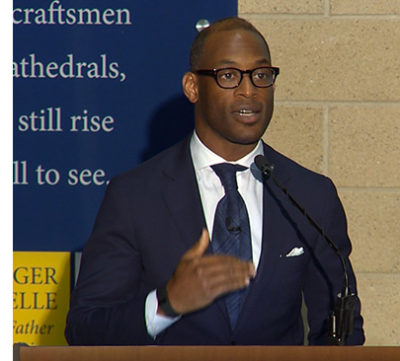February 2017 Monthly Letter
Dear Reconcilers,
Martin Luther King Event at Fuller Theological Seminary on January 18, 2017. Every year world famous Fuller Seminary in Pasadena, California sponsors a guest speaker as part of their commemoration of the Martin Luther King, Jr. weekend.
This year a team from ORM (Pastors Bermie Dizon, Neil Earle, resident pastor Jillian Caranto, and myself), showed up to hear Dr. J. Kameron Carter of Duke Divinity School give his address on the subject of coping with what he called the Post-Racial Blues.
I asked historian and ‘Reconcile’ editor Neil Earle from Grace Communion International to give his report on what took place:
“I liked the title Post-Racial Blues right off the top,” Neil said. “Being very much aware of the civil rights struggles of the early 1960s I have been feeling that the label of a ‘post-racial society’ after the election of President Barack Obama was hardly accurate. The idea of ‘post-racial’ is an intellectual concept to express that we in America have moved beyond the old racial tensions into a supposed nirvana of racial understanding, if not racial peace.
“Dr. Carter is one of the rising class of black intellectuals who cannot accept this diagnosis. He did not disappoint with 250 students and faculty (including President Lamberton) spread out before him.
“After the extremely live-wire music the speaker launched into a skillful comparison of the African-American experience of the Blues with a text from the strange biblical book called The Lamentations of Jeremiah. ‘I’m talking of the deep down born-in-the Delta blues of Muddy Waters and B.B. King and Billie Holliday,” Dr. Carter emphasized. ‘Conceived in the dusty back roads and the cypress swamps the Blues are not so much music as a visceral commentary on the experience of exile, not unlike the Jews in Psalm 139.”
“This was a brilliant way, I thought, to encapsulate the lull in racial progress we have all been living through these past years, even with an exemplary African-American family in the White House. It gave me a chuckle to reflect that in spite of Dr. Carter’s very dramatic speaking style and his ‘Joe Cool’ baseball cap, his message was as biblical as it gets. In times of stagnation and bitterness, he emphasized, we have to embrace Lamentations 3:21, I have hope.
“’The mood switches. Hope is the prescription for the Blues. This is the hope that reached down to the depths of the slave ships,’” Dr. Carter continued, ‘the hope that animated the generation that marched with Martin Luther King, Jr. The steadfast love of the Lord never ceases.’
“Carter’s message climaxed where all good Old Testament writers liked to end up, with the Hebrew concept of Hesed, sometimes translated “loving kindness” or “steadfast love.” Hesed is a beautiful Old Testament word and Dr. Carter had the audience with him as he reminded us of the meanings contained, concepts such as justice, fair play, mercy, kindness, goodness—all attributes of flowing from God’s everlasting love toward people under oppression.
“’Hesed’ was also linked in the Biblical prophets with the call for ‘righteousness.’ The double-barreled meaning surfaces in a text Martin Luther King, Jr. was fond of quoting: ‘Let justice roll down like waters, and righteousness like an everlasting stream’ (Amos 5:24, RSV).
“In that sense, then, Dr. Carter’s message resonated with words of Dr. King and pointed us in hope to the unfinished work ahead. It was a message we all felt worth hearing again.”
Thanks for joining us on the journey, God bless you all.
Curtis May and Neil Earle

